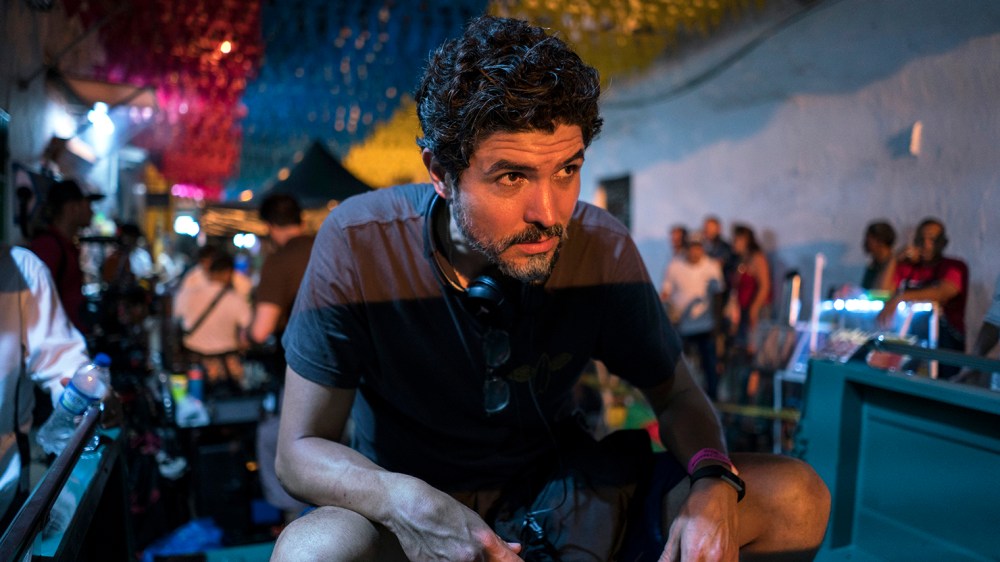‘Sound of Freedom’ Director Calls QAnon Labels ‘Heartbreaking,’ ‘Not True,’ Debunks With Details of Film’s Origins

Despite its status as the highest-grossing indie film since 2019’s “Parasite,” “Sound of Freedom” has been dismissed as a QAnon fever dream by large swaths of the mainstream media. But that derisive label is “so ridiculous” to the film’s writer-director Alejandro Monteverde, who began working on the project in 2015, two years before QAnon emerged.
“The origin [of the film] has been avoided, purposely or accidentally, in the media,” Monteverde said. “The origin will answer a lot of these misconceptions on the film.”
Back in 2015, the Mexico-born, L.A.-based Monteverde says he was unaware of the scourge of child sex trafficking until he watched a network news segment on the subject. What he learned “shook my soul because I didn’t really believe it [existed],” he says. “I just, in my head, could not put those two pieces together — an adult and a child.”
That night, he couldn’t sleep. So, the next morning, he discussed the impact of the news segment with his wife and mother of their three children, actress Ali Landry. She urged him to begin researching and writing a screenplay.
“At that time, the movie was called ‘The Mogul,’ and it was purely fictionalized,” he adds.
Not long after, the film’s producer, Eduardo Verástegui, met Tim Ballard, a former special agent for the Department of Homeland Security, and the project morphed into a story based on Ballard’s time when he was assigned to the Internet Crimes Against Children Task Force and deployed as an undercover operative for the U.S. Child Sex Tourism Jump Team. Jim Caviezel signed on to star as Ballard, with Mira Sorvino, Bill Camp, José Zúñiga and Verástegui rounding out the cast.
Since its July 4 release, “Sound of Freedom” has earned $173 million in the U.S. and Canada — a staggering figure that has already eclipsed the domestic haul of “Mission: Impossible — Dead Reckoning.” (“Sound of Freedom’s” $14.5 million budget is roughly one-twentieth of “Mission: Impossible’s” $291 million.) And that $173 million tally will only grow as a robust international release kicks off in the coming days. Still, “Sound of Freedom” has spawned negative headlines, thanks in part to some of Caviezel and Ballard’s comments that reference QAnon tropes, particularly that child trafficking is tied to “adrenochrome harvesting.”
“There’s people that are too close to the film that are in politics,” he says of Caviezel and Ballard, who attended a Donald Trump-hosted screening of the film in July. (Monteverde did not attend.) “So it’s like, I love you, but I have to keep my distance.”
Lost in the “Sound of Freedom” discussion is any acknowledgment of Monteverde’s accomplishments as a filmmaker. His 2006 immigrant drama “Bella” landed the top prize at the Toronto Film Festival — the same honor won by Oscar best picture winners “Slumdog Millionaire,” “12 Years a Slave” and “Nomadland.” And though “Sound of Freedom” doesn’t overtly take a political stance or reference QAnon, and is closer in tone to an action film like “Sicario,” it was quickly dubbed MAGA-friendly. (Distributor Angel Studios, which saw success with Biblical drama “His Only Son” earlier this year, even screened the film for members of Congress representing both Democratic and Republican parties.) NPR called it “a Christian thriller” without explanation. Monteverde bristles at the faith-based label, noting that there are only a couple of brief references to religion in the film.
“I believe labels such as ‘faith-based’ exclude people, and my intention as a filmmaker is never to exclude but to include everyone, all audiences. We made ‘Sound of Freedom’ for people of faith, people without faith and everyone in between,” he adds.
Monteverde sat down with Variety via Zoom hours before catching a flight to Colombia for the start of the film’s international rollout. The 45-year-old helmer talked about the challenges of his film getting caught in the culture-war crosshairs and whether a sequel is in the cards.
How did you get involved with Tim Ballard?
Eduardo calls me and says, ‘Have you heard about [Ballard]?’ Google him and call me back. At that time, there were like three or four things online about him. He was not the controversy that he is today, not as popular with the selfies, all of that it was more contained. I said, ‘Well, I would love to meet with him just to get information, pure research material. I need him. And when [Tim and I] were talking, I’m asking all these questions, finding more and more about his story, and I realized that his story was surpassing my little fiction film that I was writing. I say, ‘Are your life rights available?’ He says, ‘Funny you ask.’ He was in L.A. doing the rounds with the studios. He was more interested in doing like a series. I say, ‘No. Let’s make a movie.’ Long story short, boom, I get his life rights [for this film], and the real writing begins. Then, [Rod Barr and I] wrote the screenplay, but it took two years because [Ballard] was not approving. Finally, we met in the middle. All I wanted was to present a question about the problem: human trafficking, child trafficking, child sexual exploitation. How bad the problem is. We shot in 2018. In 2019, it was a completely finished film [before QAnon became a phenomenon].
Why did it take so long to release it?
It was with Fox International, so the movie did get lost in limbo [after Disney acquired Fox in 2019]. And then, you know, the producer raised a little bit of money and bought the film back. Then we were thinking, ‘OK, let’s go out [and shop it].’ Then COVID. Boom. People were always telling you even before they saw the film, ‘Right now, people want to see uplifting films.’ Then, the Harmon brothers [who founded Angel Studios] came in, and they just had a completely different way of marketing a film that I’ve never seen. They told me, ‘We’re going to put a video at the end of where Jim will talk [and urge audiences to pay it forward by buying a ticket for a future patron]. I was like, ‘Arghhhhh.’ I became a pain. And they told me, ‘Alejandro, let us do our work. You have to trust us.’ And we made a deal.
How much has the Pay It Forward program contributed to the overall box-office?
Like 4% to 7%. I don’t know the number, but I know it’s under 10%.
What do you make of all the negative press?
I was like really sick. I was like, ‘This is all wrong. That’s not true.’ It was heartbreaking when I saw all this polemic and all this controversy going on. My instinct was to run. I want to hide. I don’t want to give any more interviews. Before the movie came out, I did a couple of interviews. Look, when you hire people, what they do on the free time, I can’t control. I was a director. I wrote the screenplay. I hired the actor I thought was the best for this film. The subject matter was very personal to him. [Caviezel] adopted three children from China. When we met and discussed the project, he broke down in tears. And I was like, ‘Wow, this guy’s gonna be willing to die on the set.’ And that’s what you want, you know? You want somebody who works for you. And he dove in.
Given that the film got caught in the culture-war crosshairs, any regrets about casting Jim?
I try to never look back into any regrets because there’s nothing I can do about it now. Jim came to the set. I’ve never seen somebody so committed and so professional on set. He came in and really bled for the film to the point …
What was he like on set?
Jim was at the level of going to a hospital one day. Like he was really sick. But I didn’t have a contingency. If I didn’t shoot that day, we will lose the location. So I went to Jim and I’m like, ‘Jim, we need to shoot this.’ He comes out with a bucket. The bucket was not in the scene. He was throwing up for real. He could barely walk. So, I say, ‘I want to rewrite it. Like you’re hungover.’ And he could only give me one, max two takes. I respect that as a director to have an actor that is just gonna die for the part. What they do after? Everybody’s entitled to [speak their mind]. Now, on this particular film, yes, it did hurt my work. And that’s why I’m here talking now instead of secluding myself. It’s time for me, the author, the writer and the director, to say what was the motive of the film.
Going into opening weekend, what was your high-end expectation for the box-office?
I was thinking like $5 million. I will be really happy with that. $14 million I thought for the whole run.
Are there any plans for a sequel?
There’s definitely a lot of interest to exploring [the subject] a little deeper, because this is just the tip of the iceberg. There’s a lot of interest to kind of explore Haiti, what’s happening in Haiti. There’s [sequel] talks focusing on Haiti.
Did Tim work in Haiti? Or would it be a spinoff with a different character?
Haiti was a big part of Tim’s work. I was very tempted to do Haiti on this film. But I wanted to do an origin story, and it was too much material. I needed to end where I ended.
Is Angel Studios going to run an awards-season campaign for the film?
I would love that. We haven’t talked about anything. For me, it would be incredible even just to go and sit down in one of those [Dolby Theatre] chairs.
VIP+ Analysis: Media Lessons From ‘Sound of Freedom’ Success

